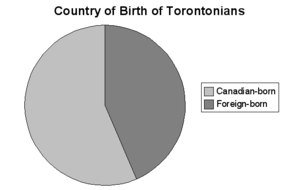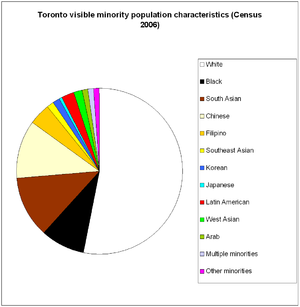- Demographics of Toronto
-
The demographics of Toronto make Toronto one of the most multicultural cities in the world. Data released by Statistics Canada as part of the 2006 census indicates that Toronto is more ethnically diverse than Miami, Los Angeles, and New York City. 49.9% of Toronto's population is foreign-born.[1]
A majority of Torontonians claim their origins from as either in whole or part from England, Scotland, Ireland and Italy. There is a significant population of Afghans, Arabs, Barbadians, Bengalis, Chinese, Colombians, Dutch, Ecuadorians, Filipinos, French, Germans, Greeks, Grenadians, Guyanese, Hungarians, Indians, Iranians, Jamaicans, Jews, Koreans, Mexicans, Pakistanis, Poles, Portuguese, Romanians, Russians, Salvadorans, Somalis, Sri Lankans, Tibetans, Trinidadians, Ukrainians, Vietnamese, and Vincentians throughout the city. Neighbourhoods such as Chinatown, Corso Italia, Little India, Greektown, Koreatown, Little Jamaica, Little Portugal and Roncesvalles are examples of these large ethno-cultural populations.[2].
Christianity is the largest faith group in Toronto's census metropolitan area, with Roman Catholics comprising 33.4% of the population. The Anglican Church and United Church of Canada account for 6.9% each. Other religious groups include Islam (5.5%), Hinduism (4.1%), Judaism (3.5%), Buddhism (2.1%), and Sikhism (1.9%). 16.6% of the population claim they have no religious affiliation.[3]
While English is the predominant language spoken by Torontonians, Statistics Canada reports that other language groups are significant, including Chinese, Portuguese, Tamil, Arabic, Persian, Pashto, Urdu, Spanish, Punjabi, Somali, Gujarati and Italian. Canada's other official language, French, is spoken by 1.4% of the population.
Contents
Basic information
Municipal population 1831 3,969 1841 14,249 1851 30,775 1861 44,821 1871 59,000 1881 96,196 1891 181,215 1901 156,098 1911 376,538 1921 521,893 1931 631,207 1941 657,612 1951 675,754 1961 672,407 1971 712,786 1981 599,217 1991 635,395 2001* 2,481,494 2006* 2,503,281 *After amalgamation City of Toronto (2006 census) 2,503,281 Toronto Census Metropolitan Area
(2006 census)5,113,149 Annual Growth Rate 0.2% Population growth studies have projected the City of Toronto's population in 2020 to reach 3,000,000, and the Greater Toronto Area would reach a population of roughly 7.5 million in 2025. Toronto's population grew by 1.0% from 2001 to 2006, with an annual growth rate of 0.2%. As of 2001, 17.5% of the population was 14 years and under, and 13.6% was 65 years and over; the median age was 36.9 years. Most recent studies show this has dropped to around 35.4 years of age, and the growth rate has increased to 0.4%.
Multicultural diversity
 In 2001, 43.7% of Torontonians were foreign-born.[4]
In 2001, 43.7% of Torontonians were foreign-born.[4]
Toronto is one of the world's most multicultural cities. In 2004, the United Nations Development Programme (UNDP) ranked Toronto second, behind Miami, Florida, in its list of the world's cities with the largest percentage of foreign-born population. Miami's foreign-born population is dominated by those of Cuban and Latin American descent, unlike Toronto's foreign-born population, which is not dominated by any particular ethnic group.
The 2006 census indicates 46.9% of Toronto's population is composed of visible minorities; 1,162,630 non-Whites, or 23% of Canada's visible minority population, live in Toronto; of this, approximately 70% are of Asian ancestry. Annually, almost half of all immigrants to Canada settle in the Greater Toronto Area. In March 2005, Statistics Canada projected that the combined visible minority proportion will comprise a majority in both Toronto and Vancouver by 2012.
Ethnicities in the City of Toronto (2006)
Source: Stats Canada 2006 Toronto Community Profile: Visible MinoritiesPopulation % Ethnicities White / Aboriginal 1,313,930 53.1 South Asian 298,370 12.0 Chinese 283,075 11.4 Black 208,555 8.4 Filipino 102,555 4.1 Latin American 64,855 2.6 West Asian 42,755 1.7 Southeast Asian 37,495 1.5 Korean 34,220 1.4 Arab 22,485 0.9 Japanese 11,965 0.5 Multiple minorities 31,100 1.3 Other 25,195 1.0 Total population 2,476,565 100 Ethnicities in the Toronto CMA (2006)
Source: Stats Canada 2006 Toronto CMA Community Profile: Visible MinoritiesPopulation % Ethnicities White / Aboriginal 2,898,005 57.1 South Asian 684,070 13.5 Chinese 486,330 9.6 Black 352,220 6.9 Filipino 171,980 3.4 Latin American 99,295 2.0 West Asian 75,475 1.5 Southeast Asian 70,215 1.4 Korean 55,265 1.1 Arab 53,430 1.1 Japanese 19,010 0.4 Multiple minorities 60,075 1.2 Other 46,705 0.9 Total population 5,072,075 100 Religion
Roman Catholics accounted for 33.4% of the population of the City of Toronto in 2001, followed by Protestants with 21.2%. The city also has Islam (6.7%), Christian Orthodox (4.9%), Hindu (4.1%), Jewish (3.5%), Buddhist (2.1%), Sikh (1%), and other communities; 16.6% reported no religious affiliation.[5]
Languages
While English is the predominant language spoken by Torontonians, Statistics Canada reports that other language groups are significant including Chinese, Portuguese, and Italian. Only 1.4% of city residents claim French (Canada's other official language) as their mother tongue, and a scant few are bilingual in English and French.
Mother tongue by population
(Toronto CMA 2006)[6]
- English: 2,849,285
- Italian: 194,620
- Chinese (not otherwise specified): 175,900
- Cantonese: 170,490
- Punjabi: 137,730
- Tagalog: 113,875
- Portuguese: 113,015
- Spanish: 112,875
- Urdu: 105,555
- Tamil: 98,265
- Polish: 81,975
- French: 72,590
- Russian: 66,070
- Persian: 65,755
- Mandarin: 63,820
- Arabic: 60,800
- Gujarati: 57,100
- Greek: 48,810
- Korean: 48,795
- Vietnamese: 46,955
- German: 42,075
Immigration patterns
According to the Canadian government, Toronto has the highest per capita immigration rate in the world.[7] Within Canada itself, 43% of all new immigrants to Canada settle in the Greater Toronto Area adding significantly to Toronto's population.
References
- ^ A city of unmatched diversity, The Toronto Star, December 5, 2007
- ^ "Population by selected ethnic origins (Toronto)". Statistics Canada. 2001. http://www12.statcan.ca/english/census01/products/highlight/ETO/Table1.cfm?Lang=E&T=501&GV=2&GID=535. Retrieved May 20 2006.
- ^ "Religions in Canada (Toronto)". Statistics Canada. 2001. http://www12.statcan.ca/english/census01/products/highlight/Religion/Page.cfm?Lang=E&Geo=CMA&View=2a&Code=535&Table=1&StartRec=1&Sort=2&B1=501&B2=1. Retrieved May 19 2006.
- ^ http://www40.statcan.ca/l01/cst01/demo47a.htm
- ^ "2001 Community Profiles, Toronto, Ontario (City)". Statistics Canada. 2001. http://www12.statcan.ca/english/profil01/CP01/Details/Page.cfm?Lang=E&Geo1=CSD&Code1=3520005&Geo2=PR&Code2=35&Data=Count&SearchText=toronto&SearchType=Begins&SearchPR=35&B1=All&Custom=. Retrieved 19 May 2008.
- ^ Detailed Mother Tongue, Toronto CMA 2006, Retrieved on August 8, 2009.
- ^ (BP-190E)
 People of Canada
People of CanadaEthnic ancestry CanadaAfricaAmericasNorth AmericaCaribbeanEast AsiaSouth AsiaSoutheast AsiaWest AsiaEuropeNorthern EuropeWestern EuropeCentral EuropeSouthern EuropeBalkan PeninsulaEastern EuropeOceaniaAustralianDemographics Languages · Religion · Population totals · 1666 census · 1911 Census · 1996 Census · 2001 Census · 2006 Census · 2011 Census
By province & territory.. Alberta · British Columbia · Manitoba · New Brunswick · Newfoundland & Labrador · Nova Scotia · Ontario · Prince Edward Island · Quebec · Saskatchewan · Yukon · Northwest Territories · Nunavut
By city.. Edmonton · Montreal · Ottawa · Toronto · VancouverCulture
& societyArchitecture · Art · Charter · Cinema · Citizenship · Crime · Cuisine · Education · Government · Health · History · Identity · Immigration · Law
Literature · Media · Military · Multiculturalism · Music · Nationalism · Politics · Poverty · Protection of · Social welfare · Sport · Symbols · Theatrelist of
CanadiansMembers of.. Canada's Walk of Fame · Fathers of Confederation · Historic significance · Order of Canada (Companions) · The Greatest Canadian · Victoria Cross
Individuals by.. Aboriginals · Actors · Artists · Composers · Monarchs · Musicians · Painters · Prime Ministers
Net worth · Province and city · Radio personalities · Sports personalities · TV personalities · WritersOrders, medals
& decorations Demographics of Canada
Demographics of CanadaTopics By province By city Census in Canada Aboriginal peoples Lists Categories:- Toronto
- Demographics of Canada
- Demographics by city
Wikimedia Foundation. 2010.

